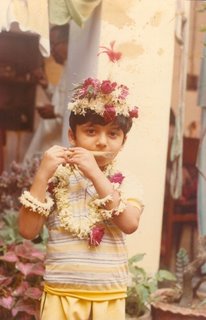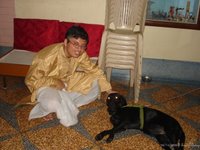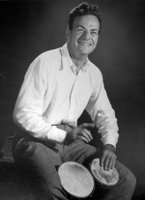It was expected that I would be tired after working throughout Saturday and Sunday from morning to night. But this much? Is this the beginning of madness? What happened to the rat?
Let me clarify a bit.
Yesterday morning, I noticed something in one of the windows of my flat overlooking the balcony. It was something stuck in the very corner of the window frame, just next to the net. It was outside the net, and so it was not clearly visible from inside.
My first reaction was to turn away. I thought it must be a cleaning cloth put there by the maid. I was getting late for office. But it started gnawing at the back of my mind... the shape of that thing seemed vaguely familiar. Finally curiosity got the better of me. I went out on the balcony to look at it from the other side.
It was a large rat. A large brown hairy rat. I couldn’t see its face as it was facing the corner. It seemed lifeless. There was a bald patch near its head which made me think that it was already decomposing. I had never seen such a large rat from so close before.
I went back inside and prodded it from the inside through the net. It didn’t move. I came out again and started thinking about the next course of action. Who will remove it? I thought if I should pick it up by the tail and throw it away, but I kept aside that idea as the last resort. I took my nose close to the rat and sniffed (Yes! I actually did that). I did not smell a rat. That meant it was still fresh. Probably the watchman wouldn’t disagree to throw it away for me. Besides, I was getting late. On a holiday probably, I would have taken a photo of that rat (now I wish I had). But yesterday I didn’t have time for that, so I got ready for office. While leaving, I went to look for the watchman. He and his whole family had vanished without a trace. I waited a little for them, and then left for office.
When I came back in the night, before I went up to my flat, I had to explain to the watchman’s family what I required. The watchman was absent, and I had a tough time explaining to his family about the dead rat. These people can speak and understand Hindi perfectly when they are discussing something about their salary. At all other times, they speak only Telugu and understand little else. After much explanation, they understood. They thought it was very funny, and assured me that the rat would be removed this morning.
When I came up to my flat, I peeked at the window again. And lo! The rat had vanished! I looked carefully all around. Not even a single hair remained to assure me that it had existed before. The position of the rat was such that it is not probable that a crow came and took it away. Then? Was it a figment of my imagination? Too much of finding bugs at work makes me find bugs (okay, a rat is not a bug, but it’s a pest anyway) at home too? Or was it just a lazy rat with a sleeping habit like Kumbhakarna? I wish I knew.
There are other strange things happening too, like when I woke up this morning, my spectacles were lying on the floor mat. I keep them beside my pillow when I sleep, on the side opposite to the floor. But I must think of one problem at a time.
So I must solve the mystery of the missing mouse first.





